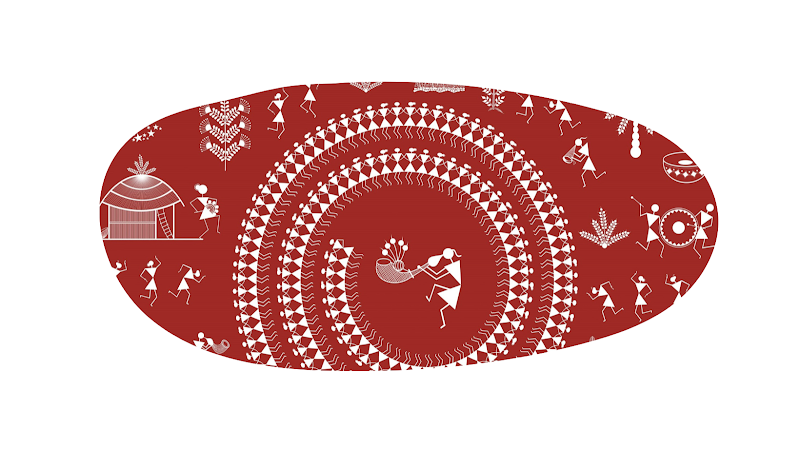
What is the concept of Warli art or Warli painting?
Warli art or Warli painting, is a traditional folk art form that originated in the Warli region of Maharashtra, India. It is one of the oldest forms of tribal art in India and has a rich cultural and historical significance. The Warli people, who are the indigenous tribal community of the region, use this art form to depict their daily life, rituals, and folklore.
Warli Wonders: Tribal Art Marvels
Simple and Geometric Designs:
Warli paintings are characterized by simple geometric shapes such as circles, triangles, and squares. These basic shapes are used to create intricate patterns and scenes.
White on Brown:
Traditionally, Warli paintings are done on brown or red ochre backgrounds using a white pigment made from rice paste or other natural materials. The use of a limited color palette enhances the simplicity and rustic charm of the art.
Depiction of Village Life:
The paintings often depict scenes from rural life, including farming, hunting, fishing, festivals, and daily activities. Human and animal figures are represented in a stylized and symbolic manner.
Rituals and Folklore:
Warli art is closely associated with the tribal rituals, traditions, and folklore of the Warli community. It often features deities, rituals, and mythological elements that are significant to the tribal culture.
Harmony with Nature:
The art form reflects the deep connection of the Warli people with nature. Trees, animals, and other elements of the natural environment are commonly represented in Warli paintings.
Lack of Perspective:
Warli art is known for its lack of perspective. The absence of a horizon line or vanishing point gives the paintings a two-dimensional and symbolic quality.
Community Art:
Traditionally, Warli art was a communal activity, with women of the tribe coming together to create large mural-like paintings on the walls of their homes. These paintings were often created during special occasions, ceremonies, or festivals.
Warli art has gained recognition and popularity beyond the tribal communities and is now appreciated as a distinctive form of Indian folk art. Artists often adapt traditional Warli motifs and themes in various contemporary art forms, including canvas paintings, textiles, and other decorative items. The simplicity and cultural richness of Warli art continue to captivate art enthusiasts around the world.
.webp)
Global Recognition:
Warli art has gained international acclaim for its unique style and cultural significance. Artists and art enthusiasts around the world appreciate the simplicity and universality of Warli motifs, leading to its integration into contemporary art scenes.
Adaptation in Contemporary Art:
While traditional Warli art is often done on walls, contemporary artists have adapted the style to various mediums. Warli paintings can be found on canvases, paper, cloth, and other surfaces. Artists also explore new color palettes and experiment with the traditional forms to create modern interpretations of Warli art.
Preservation Efforts:
Given the cultural importance of Warli art, there have been efforts to preserve and promote this traditional form. NGOs, cultural organizations, and the government have supported initiatives to train Warli artists, organize exhibitions, and document the rich heritage of Warli painting.
Commercialization:
With the rise in popularity, Warli art has also become commercialized. You can find Warli-inspired designs on various products such as clothing, home decor items, and stationery. While this has helped in spreading awareness about the art form, there are concerns about maintaining the authenticity and integrity of traditional Warli painting.
Warli art continues to evolve, striking a balance between tradition and modernity. Its timeless appeal lies in its ability to convey the essence of a rural, tribal lifestyle and the deep connection between humans and nature.
.webp)
Read more about Warli Art
Which paint is used for Warli painting?
Enhance your Warli painting with authentic colors! Use traditional Warli paint for vibrant and timeless creations. #WarliArt #PaintingColors
Is Warli art Maharashtrian?
Explore the cultural richness of Maharashtra through its iconic Warli art. Immerse yourself in the traditional storytelling and vibrant creativity of this indigenous Maharashtrian form. #WarliArt #MaharashtraCulture
Warli Art : More online
https://en.wikipedia.org/wiki/Warli_painting
Warli painting is of tribal art mostly created by the tribal people from the North Sahyadri Range in Maharashtra, India.
https://www.exoticindiaart.com/article/warli-art-the-indigenous-tribal-art/
The warli painting essentially depicts the basic principles of life which are used to depict human figures, animal's figures, houses etc.
https://www.memeraki.com/blogs/news/warli-art-tribal-art-of-india
Warli Art and Warli painting are tribal art done majorly by the Adivasi community located in North Sahyadri Range in western India.
https://www.shutterstock.com/search/warli-painting
warli painting stock photos, 3D objects, vectors, and illustrations are available royalty-free. See warli painting stock video clips · Beautiful warli ...
– Pablo Picasso
.webp)